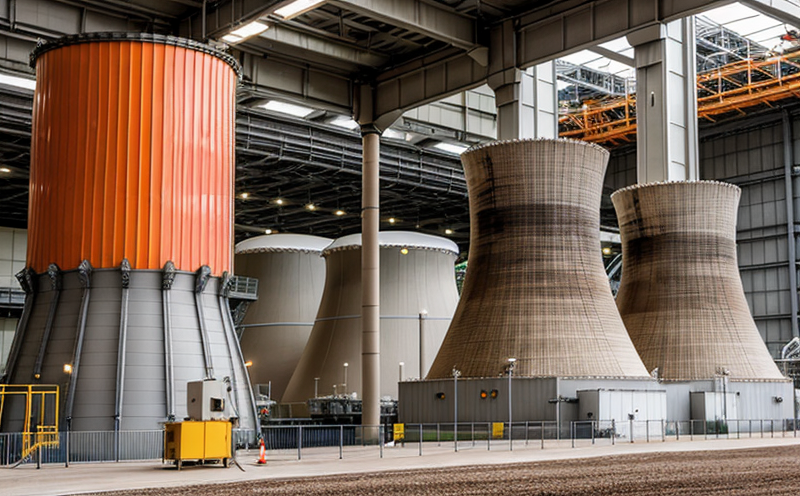ISO 7539-4 SCC Testing by Bending for Reactor Components
The ISO 7539 series of standards provides a comprehensive framework for the testing and assessment of materials used in nuclear applications. Specifically, ISO 7539-4 focuses on the evaluation of materials through bend tests using the Standard Charpy V-notch (SCCV) technique. This service is crucial for reactor components due to their critical role in ensuring safety and reliability within the nuclear power sector.
During a bend test, the material specimen is subjected to controlled bending until it fractures or meets predefined criteria indicating its ductility and toughness. The SCCV notch introduces localized stress concentrations, which simulate the effects of potential flaws that may occur during manufacturing processes or in-service conditions. This testing method helps identify any susceptibility to crack propagation under specific loading conditions.
The relevance of this test extends beyond mere compliance with regulatory requirements; it serves as a vital tool for quality assurance and process improvement in nuclear power plant (NPP) component fabrication. By employing ISO 7539-4, manufacturers can demonstrate that their products meet stringent international standards, thereby enhancing trust from both internal stakeholders and external regulators.
To perform this test effectively, the specimen must be prepared according to precise dimensions outlined in the standard. The bend angle typically ranges between 180° and 270° depending on the specific requirements of the component being tested. Specimens are usually cut from larger plates or forgings using sawing machines followed by careful grinding operations to achieve exact geometries.
Instrumentation plays a key role in accurately measuring forces applied during bending as well as monitoring crack initiation and propagation. High-precision load cells, strain gauges, and video cameras are commonly used instruments capable of capturing critical data points throughout the testing process. Advanced software solutions then analyze this information to generate detailed reports highlighting material properties such as elongation, reduction in area, and fracture toughness.
Understanding the importance of accurate specimen preparation and appropriate instrumentation is essential not only for achieving reliable test results but also for ensuring consistency across multiple tests conducted by different laboratories. Consistency ensures that decisions based on these tests remain valid over time, supporting long-term reliability predictions about reactor components.
The data obtained from ISO 7539-4 SCCV bend testing can be utilized in various ways within the nuclear power industry. For instance, it supports ongoing research aimed at developing improved alloys with enhanced resistance to irradiation-induced embrittlement without compromising mechanical strength. Additionally, this information helps inform modifications to manufacturing processes or raw material selection strategies designed to enhance overall safety margins for operational reactors.
In summary, ISO 7539-4 SCCV bend testing offers valuable insights into the behavior of materials under bending loads, particularly those intended for use in nuclear power plants. Through rigorous adherence to this international standard, stakeholders gain confidence that their components will perform reliably throughout their service lives while adhering to strict regulatory guidelines.
| Standard | Year Published | Description |
|---|---|---|
| ISO 7539-4:2018 | 2018 | Bend test for materials used in nuclear applications. |
Applied Standards
The ISO 7539 series of standards, including the specific clause ISO 7539-4 mentioned above, provides detailed procedures for performing bend tests on materials used in nuclear applications. These standards are designed to ensure consistency and reliability across different laboratories conducting similar tests.
| Standard | Year Published | Description |
|---|---|---|
| ISO 7539-4:2018 | 2018 | Bend test for materials used in nuclear applications. |
Eurolab Advantages
At Eurolab, we pride ourselves on offering world-class services tailored specifically to meet the stringent requirements of the nuclear power industry. Our team of experienced professionals brings together expertise from multiple disciplines including metallurgy, mechanical engineering, and materials science.
We employ state-of-the-art equipment capable of delivering precise measurements necessary for accurate testing results. This includes high-precision load cells, advanced video cameras, and sophisticated software systems that facilitate comprehensive analysis of test data. Our commitment to quality is reflected in our adherence to international standards such as those provided by ISO 7539.
Our laboratories are equipped with cleanrooms designed to maintain strict environmental controls during specimen preparation and testing procedures. This ensures that any external factors influencing the outcome of tests can be minimized or eliminated entirely. Our dedication extends further through continuous training programs for our staff members, ensuring they remain up-to-date with the latest developments in nuclear materials research.
In addition to providing comprehensive ISO 7539-4 SCCV bend testing services, Eurolab offers additional value-added services including post-test consultation and report generation. Our consultants work closely with clients throughout the entire project lifecycle, offering advice on best practices for material selection and process optimization based on test results.
By choosing Eurolab, you benefit from a full range of services designed to support your organization’s commitment to excellence in nuclear power plant materials and components testing. With our expertise and resources at your disposal, you can rest assured that your components will meet the highest standards of reliability and safety.
International Acceptance and Recognition
- The ISO 7539 series has gained widespread acceptance among international organizations involved in nuclear power plant design and construction, including the International Atomic Energy Agency (IAEA).
- Many national standards bodies have adopted aspects of these guidelines into their own regulations.
- A number of regulatory agencies responsible for overseeing nuclear facilities around the globe require compliance with ISO 7539-4 when evaluating reactor components.
- The World Association of Nuclear Operators (WANO) also recommends adherence to this standard as part of its guidelines for good practice in managing and operating commercial nuclear power plants.





